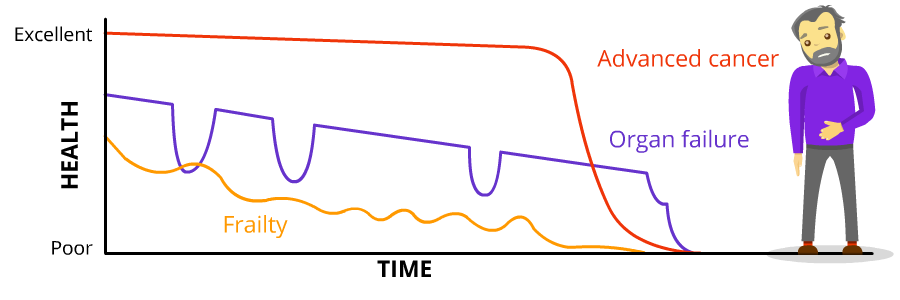Cirrhosis is usually considered a chronic disease. This means it is long-lasting and can get worse over time. Each person’s experience with it is different. Some people have no symptoms for a long time. Others have times of feeling unwell that come and go. And for some, cirrhosis can affect their ability to do every day activities.
The chart below shows some examples of how health for different people may progress over time.

Advance care planning is the process of thinking & talking about your wishes, and documenting them. These conversations usually take place over time and can be had with your family, friends and health care team. Documenting your wishes usually includes health, finance and legal planning documents. This is not only recommended for people with chronic conditions, but for everyone.
The best time to make plans for a situation when your health may get worse, is when you are well.
Once decisions regarding your medical wishes have been made, it’s best to focus on keeping as healthy as possible, living life fully and maintaining hope for good days to come.
Palliative Care
Many people think Palliative Care means End of Life Care, and that a person must be close to death to benefit from it. This is not the case. Palliative Care can include End of Life Care, but also focuses on illness at different points in time, even years before we die. Palliative Care can include the following:
- Tests to better understand and manage symptoms
- Treatment of pain and other symptoms like nausea
- Psychological, social and emotional support for you and your loved ones
- Focus on living as actively as possible
Palliative Care providers are specially trained in chronic disease symptom treatments, as well as the spiritual, social, and emotional aspects of coping with chronic illness. They can also help you understand the illness that you have, and the way that it may progress. Your liver specialist and family physician, may also discuss these issues with you.
Most people and their families need more than just medical advice and treatment explanations while they cope with a chronic disease like cirrhosis. Spiritual, social, and emotional issues play a large role in how satisfied people are with their lives. It’s important to deal with all of these issues, in addition to dealing with your cirrhosis itself.
End of Life Care
Although it can be difficult to think about, most of us will reach a point where we can no longer care for ourselves. You may wonder what options are available for people in this situation. Most communities can offer some degree of following options:

If you have new symptoms that are not being well managed at home, you may need to go to your local emergency room. The emergency physicians will decide if you need admission to hospital. Sometimes, they can treat the problem and send you back home. In other cases you may need to stay in hospital to manage your symptoms. In general, a hospital is not usually necessary for end of life care, especially if a person has documented their wishes and had advance care planning discussions with their health team and loved ones.
When a practitioner has estimated that their patient only has 4 or fewer months to live, hospice care can be accessed in Alberta. Hospice care is paid for as part of your Alberta Health benefits. Your practitioners can help you with determining your eligibility, when the time arises. In Edmonton, only Palliative Care specialists at the University of Alberta, Royal Alexandra Hospital, Grey Nuns Hospital, or the Community Palliative Care Team can refer you to be admitted to a local hospice. Typically, people who qualify for hospice are in bed most of the day, and have significant difficulty doing any activities. There are details on all local hospices, listed on www.palliative.org which is the Edmonton Regional Palliative Care Program’s website.
Many people would like to stay at home until they die. This can be possible in many cases, depending on the supports that a person may have. Some communities have Palliative Home Care, that can support the person in the home with nurses, doctors and other healthcare providers that work together with your family physician in your care. These supports can often allow you to remain in your home, rather than going into a hospital. Many people make the decision that they do not want to go to hospital, when they are close to the end of their lives.
References:
The information on this page was developed by the Cirrhosis Care Alberta project team (physicians, nurse practitioners, registered nurses, registered dietitians, physiotherapists, pharmacists, and patient advisors).
This information is not intended to replace advice from your healthcare team. They know your medical situation best. Always follow your healthcare team’s advice.
